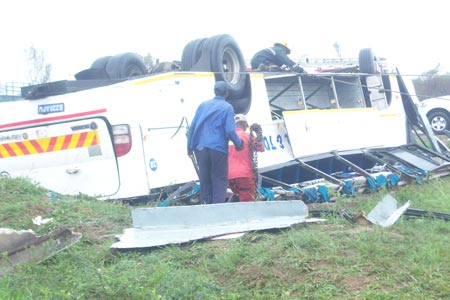
IN the past few months, hundreds of Zimbabweans have been killed in accidents on the country’s major highways
The accidents have been blamed mainly on the poor state of the roads.
Two weeks ago, Our Correspondent, Phyllis Mbanje was involved in an accident that claimed six lives along the Harare-Beitbridge road. She narrates how it happened below.
THE blood-curdling screams awaken me; the smell of metal scrapping the tarmac is nauseating.
As the bus continues to rock violently from one side to the other, the screams take a more sinister sound.
For a moment, I am lost between reality and a nightmare, but slowly realisation that we are indeed going to crash creeps into my frozen mind.
It’s Tuesday May 28, just after 10pm, we are on board a Pioneer bus from Musina, South Africa.
The bus is about 60km away from the Beitbridge border.
- Chamisa under fire over US$120K donation
- Mavhunga puts DeMbare into Chibuku quarterfinals
- Pension funds bet on Cabora Bassa oilfields
- Councils defy govt fire tender directive
Keep Reading
Someone shouts, “We are going to crash!” Another yells, “Nhai Jesu tofawo here!” (Jesus, we are dying).
I cannot find my voice; the scream that rises up from my belly dies at my throat. My heart pounds and for a moment, I am afraid it will jump out of my chest.
The bus continues its macabre dance, teetering dangerously on its four wheels, the interior is very dark, I cannot see anything.
Rumbie, my friend, is sitting next to me. Like me, she makes no sound. We hold on tightly to our seats and pray the bus will not topple over but as it gathers momentum one thought is very clear, we surely are going to perish.
It tilts to the left and topples over, landing in a ditch.
For that brief moment, there is the most deafening silence. The bus, now lying on its side, is filled with smells of dust, blood and death.
The horrible smell of one’s innards is the most pungent. The whole nightmare had taken less than a minute. And then, the screams start again, but this time they are filled with pain and confusion — panic slowly sets in.
Galvanised into action by the screams, I scramble from what’s left of my seat. I am not sure if I’m hurt, but I am just grateful my legs are intact, and so are my hands.
Blindly, I search for my mate, panicking I call out her name —glancing frantically around.
Passengers are now scrambling for an exit and someone screams “Manditsikirirawo veduwe” (you are crushing me!). Those words still haunt me.
My boot-clad feet sink into a sickening wetness, which I later realise is blood. With renewed energy, I scoot on top of the remaining seats and slowly negotiate my way out.
Rumbie stumbles upon the exit panel and quietly tells me to move aside. She kicks it open and a waft of fresh air hits us from outside. She jumps out landing on her back.
I am the second person out of the bus.
As other passengers clamber out of the bus, hope fills our hearts that we have all survived but when I look back, the grisly sight of mangled limbs and twisted body parts shocks me.
A few vehicles stop by but no one assists passengers that are still trapped inside.
Their plight becomes dire as most of those trapped on board are clueless on how to initiate rescue.
Many are still in shock while others search for their loved ones.
I do a quick body check and thank God I don’t have a scratch on me.
We go back to the exit point and peer inside with the help of cell phone torches.
Horror awaits us.
There is a woman whose head is wedged between seats. Her right ear has been completely torn away. Her body is twisted and she is not moving. A few metres away, I see a pair of legs sticking out of the rubble.
The sight is enough to drive me away for a moment.
Six people — including the friendly bus conductor, lost their lives — I later established. Thirty seven others were injured but what struck me the most is that help came after more than an hour.
The police arrive, but they do not have enough torches. They ask us for our phones so they can use them to light up the scene.
It is discovered that some bodies are trapped under the bus. Apparently, they were thrown out as the bus swerved and later landed on them.
With no tools and no fire brigade around, we can only stand and imagine the fate of our fellow travellers under the bus are suffering.
Then an ambulance arrives.
The staff looks confused. As they try to lift a woman who looks like she has a back injury, she screams out that they are hurting her.
We suggest they put her on a makeshift bed made of the torn seats. I wonder if the staff is trained or they were handpicked from some flea market.
I ask why there is just one ambulance when more than 30 people require help. They tell me there had been another accident elsewhere.
As dawn approaches, the chill gets worse. Many do not have shoes or jackets.
We pick up blankets strewn all over and cover the injured. One woman’s foot is so shredded that only the big toe remains.
MOST OF THE ACCIDENT VICTIMS DO NOT GET TREATMENT
Finally, a replacement bus arrives and most of us are taken to Beitbridge hospital. Some refuse to leave the accident scene as they want to guard their belongings, which are still locked in the trailer.
We are relieved and look forward to being treated but alas, there is just one doctor. He can only attend to those deemed “serious”.
Most of us are given paracetamol painkillers and told to wait in the cold reception area. I never saw the doctor whom I am later told went away saying he would return in the morning.
By 8am, the doctor is still to arrive. Most of us discharge ourselves and find our way to Harare to seek medical attention.
Only God knows what became of those we left behind who had serious injuries.











